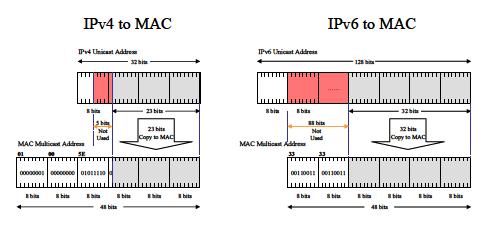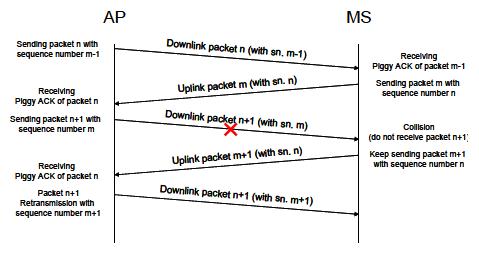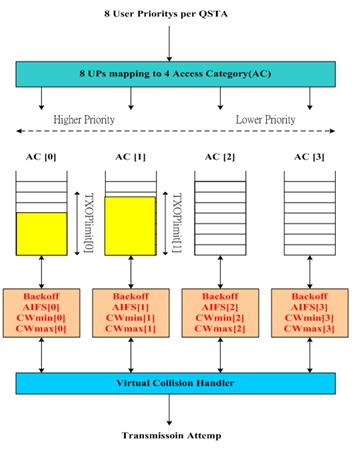
Abstract

Members

Achievement

Meetting

Links

Main Project

Chinese Version

|
|
|
|

|
QoS and Multimedia Support:
- A Low Power Unicast-to-Multicast Transmission Scheme for Voice over WLANs
- Energy efficiency is one of the critical issues of a mobile device supporting
real-time services and applications over wireless networks. This paper addresses the
power consumption problems of Voice-over-IP (VoIP) services in the 802.11 networks, and
proposes a low power medium access control (MAC) enhancement, called Unicast-to-Multicast
(UtoM) scheme, for Mobile Stations (MSs) accessing VoIP services. The proposed scheme
employs the MAC multicast transmission technique together with a frame aggregation
method to eliminate the acknowledgement frames and redundant inter-frame spacing
(IFS) that introduce extra power consumption for voice packet transmission. To avoid
packet lost due to unreliable delivery of MAC multicast frames, a collision feedback and
a piggyback ACK method are thus implemented to reduce packet lost rate, i.e. to guarantee
voice qualities, for the proposed UtoM scheme. The performance in terms of power
consumption of MSs, packet loss rates, and packet delays are evaluated and analyzed
in this paper. The results demonstrate that the UtoM scheme performs superior over
the traditional 802.11 protocol in saving energy and permits an adequate packet delay
and voice quality for VoIP over WLANs.
- Main achievements and outcomes
- Research or technology outcomes
- Power consumption problems of WLAN are going from bad to worse
VoIP services put more burdens in this issue The proposed UtoM scheme can provide
low power solution to VoIP over WLAN by Unicast/Multicast Translation Piggy ACK
Collision Feedback Packet Aggregation The simulation shows that the proposed
scheme can : Reduce power consumption in transmission Keep the quality of VoIP services.


- EDCA/CA: Enhancement of IEEE 802.11e EDCA by Contention Adaption for Energy Efficiency
- EDCA/CA
- We have proposed an algorithm, called EDCA/CA, to enhance the scheduling in
IEEE 802.11e EDCA system. The proposed algorithm can efficiently reduce the power
consumption. Besides, some QoS matrices, such as delay and jitter, are also enhanced.
By postponing the traffic while network is under heavy traffic load, EDCA/CA can reduce
the collision. The proposed algorithm is fully compatible with standard
- Main achievements and outcomes
- Research or technology outcomes
- The proposed mechanism does not need to change standard.
Besides, by only adjusting three parameters, the energy consumption and delay can
be dramatically reduced. The proposed mechanism has been accepted by IEEE
Transactions on Wireless Communications.

|
 |
|